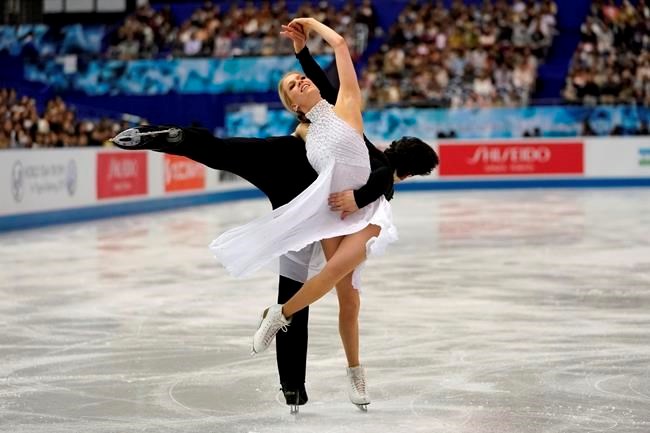Pride month means a little bit more to Canadian figure skater Kaitlyn Weaver this year.
The two-time Olympian and former Canadian ice dancing champion publicly came out as a queer woman on Friday in an interview with CBC and in a post on Instagram.
Sharing her authentic self with the world has been "overwhelming," Weaver said in an interview with The Canadian Press.
“I made my post this morning, which was scary but exciting. And then I put my phone down and we went paddle boarding. … I just wanted to kind of let it soak in," she said from the Hamptons, where she's on vacation.
Hours later, she returned to messages of love and support.
“It’s just such a heartwarming feeling to know that now I can be my most authentic self and I have some people in my corner as well."
It's been about a decade since Weaver, 32, realized she was queer but she avoided facing her sexuality, concerned about the impact it could have on her career. She was afraid people would think she was faking her connection with skating partner Andrew Poje — and that it would affect their scores.
“LGBTQ+ people are not accepted everywhere in the world and you just never know who you’re talking to. And when your livelihood depends on that, it’s scary. If it’s scary to tell friends, it’s definitely scary to tell people who are judging you for a living," she said.
“It was just never an option to come out when I was still competing. It just wasn’t even an idea I would entertain."
Instead, Weaver spent years directing all her attention toward skating and away from facing her true identity.
“As an elite athlete … you put your personal life second and your sport first," she said. "So it was easy for me to kind of set everything aside, especially things that I didn’t really like and focus all of my energy on becoming the world’s best ice dancer."
As COVID-19 gripped North America, it became harder for Weaver to find ways to stay distracted. She and her skating partner Andrew Poje had already stepped away from competing but were still doing shows, and she was skating on CBC's "Battle of the Blades."
“When the pandemic hit, I didn’t have any of that and I was facing this skeleton in the closet of just understanding and accepting my own identity as a queer woman," she said. "It was a lot.”
Weaver worked with a mental health team to process and accept herself, and has slowly come out to loved ones. Telling Poje was difficult, she said.
“That was probably the scariest. But he’s nothing but supportive," Weaver said. "He’s just a pillar in my life and always has been and, lucky for me, always will be.”
The pair plan to continue working together, she added, but aren't sure whether they'll go back to competitive skating.
“I’m not sure if my body could take it," Weaver said with a laugh.
As a lifelong figure skating fan, Weaver plans to continue working in the sport as much as possible and wants to find ways to make the sport more accessible for others.
“I just want to show people that you can do it," she said. "And I want to be here making it feel safe. And that’s where I’ll start and see where the work takes me.”
She knows that her story will be important in opening figure skating to other queer athletes. While some male skaters have come out publicly in recent years, there are few — if any — openly queer female skaters.
“Queer women don’t see themselves in our sport," Weaver said. "They don’t see their identities being represented in our sport because stereotypically, it’s the hyper-feminine pretty princess, that’s the stereotype of the female figure skater and that’s not necessarily what everybody identifies as.
“It’s similar, in my opinion, to a guy coming out on a football team or a soccer team. It’s just like you’re the odd one out. It’s hard to do that. It’s hard to be the first."
This report by The Canadian Press was first published June 11, 2021.
Gemma Karstens-Smith, The Canadian Press




